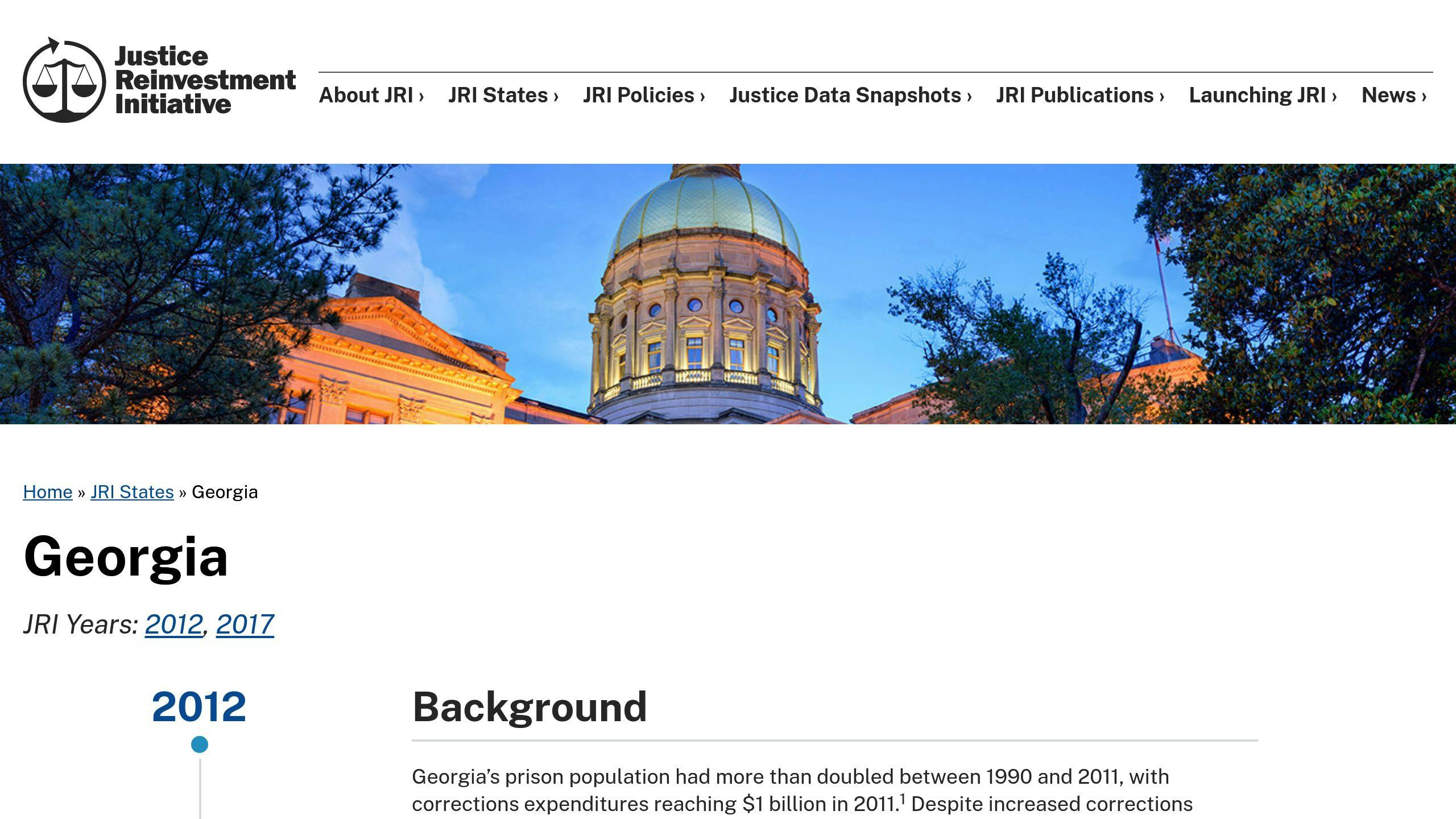- Overcrowding and understaffing: Despite reforms, prisons remain dangerously overcrowded, with staff shortages creating unsafe conditions.
- Unsafe living conditions: Many inmates face poor medical care, unsanitary environments, and limited access to education or family contact.
- Gang activity: Violence and gang influence thrive in overcrowded, poorly supervised facilities.
Key Progress So Far:
- Sentencing reforms: House Bill 1176 reduced annual prison commitments by 17.4% from 2010 to 2016.
- Justice Reinvestment Initiative: Focused on reducing non-violent offender commitments and cutting jail backlogs by 84%.
- Community efforts: Groups like the Georgia Justice Project have driven 23 legal changes since 2012, easing reentry barriers.
How You Can Help:
- Advocate for better rehabilitation programs and alternatives to incarceration.
- Support initiatives like bail reform and record expungement.
- Engage with organizations like the Georgia Justice Project and Reform Georgia to push for systemic change.
Georgia’s prison reform is making strides, but there’s still a long way to go. The rest of this article dives deeper into the challenges, solutions, and ways you can contribute to meaningful change.
Criminal Justice Reforms That Restore & Empower
Major Problems in Georgia’s Prisons
Georgia’s prisons are grappling with serious challenges like unsafe conditions, overcrowding, understaffing, and gang-related issues. These problems highlight the urgent need for systemic change.
Unsafe Conditions and Rights Violations
Prisoners often face dangerous environments, poor medical care, and a lack of rehabilitation programs. These issues not only violate constitutional rights but also make it harder for inmates to reintegrate into society. The Georgia Council on Criminal Justice Reform has identified several key areas of concern:
- Inadequate healthcare: Many inmates struggle to access proper medical services.
- Unsanitary living conditions: Facilities often fail to meet basic hygiene standards.
- Lack of educational programs: Opportunities for learning and skill-building are severely limited.
- Restricted family and legal contact: Inmates face barriers to maintaining relationships or seeking legal assistance.
Overcrowding and Staffing Issues
Despite a 3.5% drop in the prison population by 2016, overcrowding and staff shortages persist. Georgia spends over $1 billion annually on corrections [3], yet many facilities remain understaffed. This makes it nearly impossible to maintain proper supervision, compromises safety, and limits access to rehabilitation programs.
Gang Activity and Violence
The combination of overcrowding and understaffing has allowed gangs to gain influence, leading to increased violence and intimidation. This not only endangers inmates and staff but also makes rehabilitation efforts far more difficult. The rising number of inmates convicted of serious crimes adds to the challenge of maintaining order and security within the system.
Efforts like House Bill 1176 have aimed to tackle overcrowding through sentencing reforms. However, addressing these deep-rooted issues will require policy changes, better use of technology, and active community involvement.
Common Questions About Prison Reform
What Are the Main Goals of Prison Reform?
Georgia’s prison reform efforts focus on lowering incarceration rates, improving rehabilitation programs, and addressing racial and economic disparities in the justice system. From 2010 to 2016, these efforts led to a 17.4% drop in annual prison commitments, falling from 21,841 to 18,035 [3].
How Does the Justice Reinvestment Initiative Help Georgia?

The Justice Reinvestment Initiative, supported by House Bill 1176, has played a key role in Georgia’s prison reforms. Here’s what it has achieved:
- A 13% drop in prison commitments for non-violent drug and property crimes
- A 9% reduction in probation commitments
- An 84% decrease in jail backlog, from 5,338 in March 2009 to 818 in January 2016 [3]
These efforts have allowed the state to better allocate prison resources. For example, the percentage of inmates convicted of serious crimes rose from 58% in 2009 to 67% in 2017 [3], ensuring that violent offenders are prioritized for incarceration.
How Are Technology and AI Used in Prison Reform?
Georgia is leveraging technology to guide its prison reform strategies. The Department of Corrections uses data analytics to monitor safety, track population trends, and measure the success of rehabilitation programs. These tools help tackle challenges like overcrowding, understaffing, and safety concerns.
While technology addresses broader systemic issues, local reforms focus on addressing immediate community needs.
What Changes Can Be Made at the Local Level?
Local-level reforms are addressing critical issues, particularly in pre-trial detention. According to Reform Georgia, 64% of individuals in the state’s county jails are in pre-trial detention without a conviction [4]. This has led to several important initiatives:
- Expanding alternatives to incarceration, such as bail reform and diversion programs for minor offenses
- Improving inmate communication options to help maintain family connections
Organizations like the Georgia Justice Project are also working with communities to reduce barriers to reentry and provide better rehabilitation opportunities [2]. These grassroots efforts, combined with statewide reforms, create a more effective and balanced approach to prison reform.
sbb-itb-7858f51
How to Support Systemic Change in Prisons
Groups Working on Prison Reform
In Georgia, several organizations are actively working to improve the prison system, each focusing on specific challenges. The Georgia Justice Project (GJP) has achieved notable progress, with 23 changes to Georgia law since 2012 [2]. Their efforts include enhancing the First Offender law and establishing an automated system for early probation termination.
Reform Georgia addresses core issues such as ending cash bail, reforming probation systems, and eliminating profit-driven incarceration practices [4]. Their work has helped reduce prison populations and improve conditions for those incarcerated.
Georgia Prisoners’ Speak (GPS) plays a key role in highlighting systemic problems in Georgia’s prisons. In 2023, GPS documented severe overcrowding at Central State Prison, gathering over 5,000 petition signatures that led to a legislative review of the facility. Their advocacy focuses on exposing constitutional violations and equipping citizens with resources to contact government officials and media outlets.
Together, these organizations provide pathways for individuals to take informed and impactful action, as detailed below.
Ways to Advocate for Change
| Advocacy Method | Action Steps | Impact |
|---|---|---|
| Direct Engagement | Engage directly with policymakers through campaigns and outreach | Shapes policy decisions |
| Coalition Building | Partner with organizations like GJP | Strengthens reform efforts |
| Digital Advocacy | Share stories and report violations through advocacy platforms | Increases transparency and awareness |
| Community Support | Join Second Chance campaigns | Supports reentry and rehabilitation programs |
Efforts like these aim to address systemic issues such as overcrowding and inadequate rehabilitation programs. A standout example is the Georgia Justice Project’s 2020 Second Chance for Georgia campaign. This initiative, backed by a coalition of 67 organizations and congregations, successfully pushed for criminal record clearing reform through Senate Bill 288 [2].
"Every day, our clients’ experiences show us how a range of systems pull people into the legal system and leave them with a record that follows for life – no matter the seriousness of the alleged offense or what that person has done since." – Georgia Justice Project [2]
This statement highlights the importance of collective action in driving change. Campaigns like Second Chance for Georgia show how coordinated efforts can lead to meaningful reforms. The Georgia Council on Criminal Justice Reform continues to evaluate and improve Georgia’s criminal justice policies [1], offering structured ways for people to contribute to proven reform strategies.
Key areas to focus on for meaningful impact include:
- Supporting record expungement reforms
- Advocating for better rehabilitation programs
- Promoting transparency in prison conditions
- Working toward bail reform initiatives
Conclusion: Moving Toward a Better System
Summary of Key Points
Georgia’s prison reform efforts have shown progress, but there’s still room for growth. The creation of the Georgia Council on Criminal Justice Reform has provided a structured approach to implementing data-driven policies and collaborations that aim to reshape the system [1].
From 2012 to 2016, Georgia’s prison population dropped from 54,895 to 52,962 inmates, reflecting the impact of these reforms [3]. However, several challenges persist, including:
- Ensuring safety and protecting the rights of both inmates and staff, with a focus on better supervision and meeting constitutional standards
- Leveraging technology for improved rehabilitation and oversight
- Addressing gang-related issues and enhancing overall security measures
The Future of Prison Reform
While progress has been made, there’s much more to be done to achieve lasting change. The Justice Reinvestment Initiative remains a key driver, aiming to reduce repeat offenses and improve rehabilitation outcomes.
Key reform priorities include:
| Reform Area | Current Progress | Future Goals |
|---|---|---|
| Sentencing Reform | Updated offense classifications | Revising mandatory minimum sentences |
| Technology & Programs | Improved monitoring systems | Expanding AI tools and education/job training |
| Community Support | Local reentry programs | Broader alternative justice initiatives |
The Georgia Justice Project has been instrumental, spearheading 23 legislative changes since 2012 [2]. Their efforts, alongside other advocacy groups, have laid the groundwork for a system that balances public safety with rehabilitation.
Achieving meaningful reform requires ongoing dedication from lawmakers, advocacy organizations, and local communities. By using technology and data more effectively and engaging the public, Georgia can continue moving toward a prison system that is fairer and more effective for everyone involved.
Resources for Learning and Advocacy
Georgia has several organizations dedicated to providing tools and support for prison reform efforts. The Georgia Council on Criminal Justice Reform is a standout resource, offering detailed reports and analyses on policy changes and reform progress. Their work helps shed light on the complexities of Georgia’s prison system.
Helpful Platforms and Tools
The Georgia Justice Project (GJP) focuses on reducing barriers to reentry and promoting second-chance employment opportunities. Since 2012, they’ve highlighted 23 legislative changes, showcasing practical reform strategies [2].
| Resource Type | Organization | Key Features |
|---|---|---|
| Policy Research | Georgia Council on Criminal Justice Reform | Reports on policy changes and reform progress |
| Advocacy Platform | Reform Georgia | Campaigns and tools for bail reform and incarceration alternatives |
| Direct Support | Georgia Justice Project | Legal assistance and reentry resources |
| Public Awareness | Georgia Prisoners’ Speak (GPS) | Advocacy tools and prison condition reports |
Reform Georgia offers a user-friendly platform tackling key issues like cash bail reform and record expungement [4]. For a deeper dive into reform outcomes, the Urban Institute’s report, "Assessing the Impact of Georgia’s Sentencing Reforms", provides valuable insights into how these changes address systemic challenges [3].
Georgia Prisoners’ Speak (GPS) equips individuals with tools to:
- Contact government representatives
- Access reports on prison conditions
- Participate in public awareness campaigns
- Support transparency efforts
These tools tackle pressing issues such as overcrowding, understaffing, and reentry obstacles. By leveraging these resources, individuals and organizations can contribute to building a fairer and more effective prison system in Georgia.
